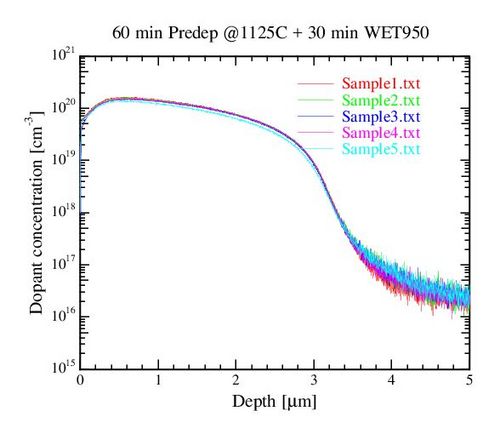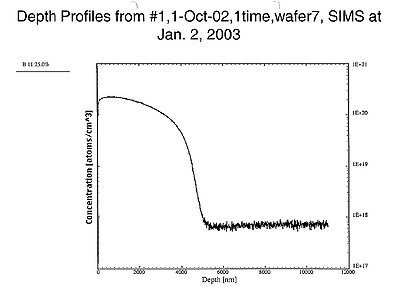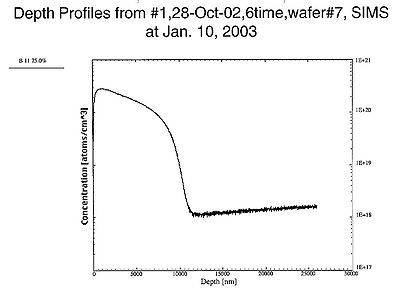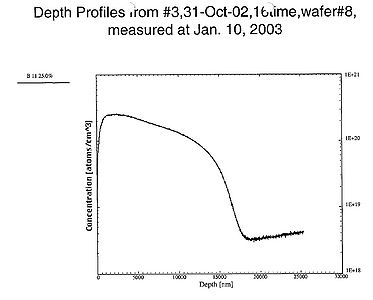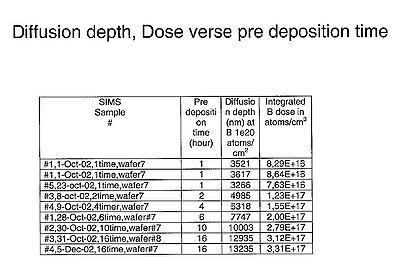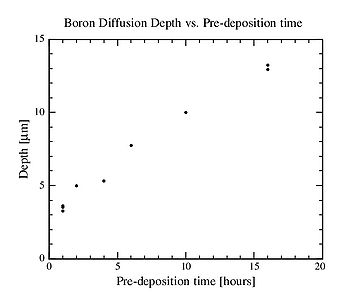Specific Process Knowledge/Thermal Process/Dope with Boron: Difference between revisions
| Line 35: | Line 35: | ||
====Experimental setup==== | ====Experimental setup==== | ||
''' | ''' | ||
3 phosphorous doped device wafers (n-type) were used. In the furnace 3 RCA-cleaned wafers were placed in the center of the boat with Boron source wafers (also RCA cleaned) with the front side facing the source wafers.A pre-deposition process was made for one hour at 1125 °C, then the source wafers were removed and the device wafers oxidized in a wet oxidation process at 950 °C for half a hour. Finally the oxide was removed in BHF and one wafer was cut into small samples for SIMS measurements. | 3 phosphorous doped device wafers (n-type) were used. In the furnace 3 RCA-cleaned wafers were placed in the center of the boat with Boron source wafers (also RCA cleaned) with the front side facing the source wafers.A pre-deposition process was made for one hour at 1125 °C, then the source wafers were removed and the device wafers oxidized in a wet oxidation process at 950 °C for half a hour. Finally the oxide was removed in BHF and one wafer was cut into small samples for SIMS measurements. | ||
The experiment has been performed at 3 different pre-deposition times 30 min, 60 min and 90 min with and without a 30 min WET950 oxidation step. The results are resumed in the figure below. | |||
''' | ''' | ||
==== | ====Results==== | ||
''' | ''' | ||
The samples for SIMS measurements corresponds to 5 different positions on the wafer. | The samples for SIMS measurements corresponds to 5 different positions on the wafer. | ||
| Line 47: | Line 49: | ||
<br clear="all" /> | <br clear="all" /> | ||
The SIMS measurement shows a good uniformity | The SIMS measurement shows a good uniformity across the wafer | ||
[[image:60min_Predep_WET950.jpg|500x600px|left|thumb|SIMS Measurement at 5 different positions after | [[image:60min_Predep_WET950.jpg|500x600px|left|thumb|SIMS Measurement at 5 different positions after pre-deposition of boron]] | ||
[[image:Boron_doping_profiles.jpg|500x600px|left|thumb|SIMS Measurement for 3 different pre-deposition times 30 min, 60 min and 90 min with and without a 30 min WET950 oxidation step.]] | |||
<br clear="all" /> | <br clear="all" /> | ||
Revision as of 15:08, 11 January 2016
Feedback to this page: click here
Dope with boron
The furnace A1 Boron Drive-in and Pre-dep can be used to pre-deposit silicon wafers with boron. The silicon wafers are positioned in a silicon carbide boat just next to wafers of boron nitride. Pre-deposit of boron is a diffusion process on the silicon wafers.
The concentration of boron in the wafer depends on the process temperature. The depth profile depends of the process time.
All this figures have been made at the time where there was a furnace only for Boron Pre-dep (furnace A2). The process was done at a temperature of 1125 oC and a flow of 5 slm N2 and 0.2 slm of O2.
- Boron profiles from SIMS
-
Pre-depostion for 1 hour at 1125 °C
-
Pre-depostion for 6 hour at 1125 °C
-
Pre-depostion for 16 hour at 1125 °C
- Boron diffusion depth vs. pre-deposition time
Uniformity test
Results made by Filip Sandborg Olsen, Dec. 2015
Purpose
To study the uniformity across af wafer that has been boron doped using a pre-deposition process and a short wet oxidation to oxidixe the boron phase layer in the Boron Predep and Drive-in furnace (A1) at DTU Danchip.
Experimental setup
3 phosphorous doped device wafers (n-type) were used. In the furnace 3 RCA-cleaned wafers were placed in the center of the boat with Boron source wafers (also RCA cleaned) with the front side facing the source wafers.A pre-deposition process was made for one hour at 1125 °C, then the source wafers were removed and the device wafers oxidized in a wet oxidation process at 950 °C for half a hour. Finally the oxide was removed in BHF and one wafer was cut into small samples for SIMS measurements.
The experiment has been performed at 3 different pre-deposition times 30 min, 60 min and 90 min with and without a 30 min WET950 oxidation step. The results are resumed in the figure below.
Results
The samples for SIMS measurements corresponds to 5 different positions on the wafer.
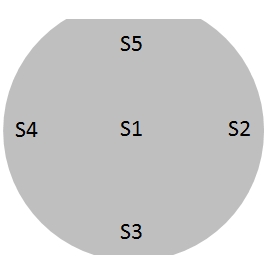
The SIMS measurement shows a good uniformity across the wafer
